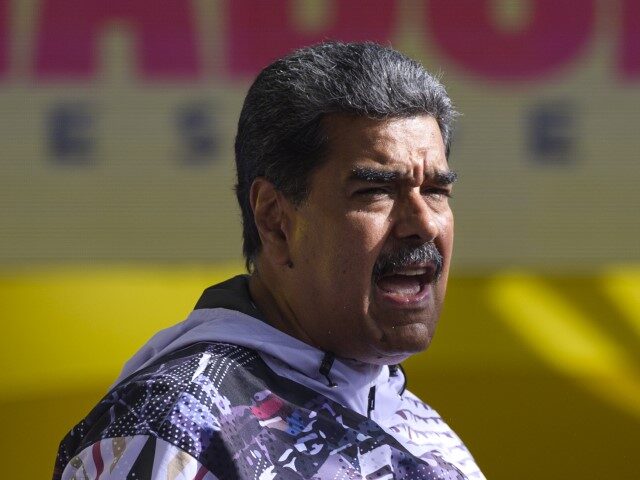Leftist Latin American governments with friendly ties to Venezuela’s socialist regime, such as Brazil and Colombia, have decided not to send observers to monitor Sunday’s sham presidential “election” this week, responding to violent statements by dictator Nicolás Maduro.
The Maduro regime will hold a sham presidential election on July 28. Maduro, who clung to power in a similar fraudulent “election” in May 2018, is seeking to secure a six-year term in office.
Sunday’s pseudo-electoral event will see Maduro “run” against several handpicked “opposition” rivals and 74-year-old former diplomat Edmundo González, the only legitimate opposition candidate that regime-controlled authorities allowed on the ballot. Maduro will appear on Sunday’s ballot 13 times.
Last week, Maduro threatened that there will be “bloodbath” and a “fratricidal civil war” in Venezuela if he does not “win” the “election.”
“The destiny of Venezuela, in the 21st century, depends on our victory on July 28. If you do not want Venezuela to fall into a bloodbath, into a fratricidal civil war, product of the fascists, let us guarantee the greatest success, the greatest victory in the electoral history of our people,” Maduro said.
Maduro’s comments prompted Brazilian radical leftist President Luiz Inácio Lula da Silva — one of the Venezuelan socialist regime’s closest allies in the region — to express that he felt “scared” in response to the remarks. Lula claimed that he had told Maduro that “the only chance for Venezuela to return to normality is to have a widely respected electoral process.”
“I was scared by Maduro’s remarks that Venezuela could face bloodshed if he loses,” Lula said. “Maduro needs to learn that when you win, you stay; when you lose, you leave.”
Maduro, without directly mentioning Lula, responded on Tuesday by suggesting that anyone scared by his comments should “drink chamomile tea.” On Wednesday, Maduro questioned the integrity of Brazil’s electoral system by claiming that, unlike the Venezuelan electoral system, “not a single identity document is verified” by the Brazilian electoral authorities.
“Where else in the world do they do that? In the U.S.? The electoral system is unable to be audited. In Brazil? They don’t even audit a single ballot. In Colombia? They don’t audit a single ballot,” Maduro said.
Brazil’s top electoral authority, the Superior Electoral Tribunal (TSE) refuted Maduro’s claims in a statement in which it asserted that it is “false” that Brazil’s electoral ballot boxes are not audited and that, as a result of Maduro’s statements, it would not send a group of electoral observers for Sunday’s sham election.
“The Brazilian electoral justice system is committed to ensuring that voters have full respect for their freedom of choice in political representation, which is why the electronic ballot box is fully secure,” the statement read. “Democracy is the beginning and the end of the unceasing, committed work and proven superiority of the national electoral system.”
The statement continued:
To make false claims about the reliability of the Brazilian electronic ballot box, which – it should be reiterated – is auditable and secure, is to sow an unacceptable affront to the seriousness, security and full publicity of Brazil’s electoral process, which is carried out with integrity, austerity and efficiency for the continued strengthening of democracy.
The TSE has faced questions regarding the integrity of the Brazilian election system from both sides of the aisle. In 2022, conservative former President Jair Bolsonaro suggested, citing government statements, that the presidential election he lost was not secure. Bolsonaro’s statements led to an eight-year ban on running for office in 2023, set to expire in 2030.
Like Brazil, Colombia’s Foreign Minister Luis Murillo announced on Wednesday that the Colombian government led by far-left President Gustavo Petro will not send electoral observers to Venezuela for the upcoming sham election despite having previously expressed its intention to send observers.
The socialist former President of Argentina Alberto Fernández, another close ally of Maduro, announced in a lengthy social media post on Wednesday that the regime had informed him that his invitation to observe the electoral event had been revoked due to statements issued by Fernández that “caused discomfort and raised doubts about my impartiality.”
Fernández appeared this week to have agreed with Lula’s remarks on Maduro’s threats, saying in a radio interview that, if Maduro is defeated in the election, “what he has to do is to accept, as Lula said, that he who wins, wins, and he who loses, loses. Period. It’s over. That’s democracy.”
“I must clarify that I do not understand such uneasiness. I only said that in a democracy, when the people cast their vote, ‘he who wins, wins and he who loses, loses’ and if the ruling party is eventually defeated, it should accept the popular verdict. The opposition should do the same in the event of an adverse result,” Fernández said in his message on the observation project.
“In view of the unusual demand, I thought it convenient not to travel and not to be accused of wanting to cloud a transcendental election day, when I was only trying to fulfill the task of an election observer,” the message continued.
Fernández accompanied his message with a copy of a letter he had received from Venezuela’s election overseers dated July 12 in which the electoral authority — controlled in its entirety by the ruling socialist regime — extended him an invitation to participate as an observer.
In May, the authority announced that it had revoked an invitation to the European Union to send a group of observers to the “election” in response to the EU’s “historically colonialist position” after it upheld individual sanctions imposed on 50 high-ranking members of the Maduro regime.
Christian K. Caruzo is a Venezuelan writer and documents life under socialism. You can follow him on Twitter here.

COMMENTS
Please let us know if you're having issues with commenting.